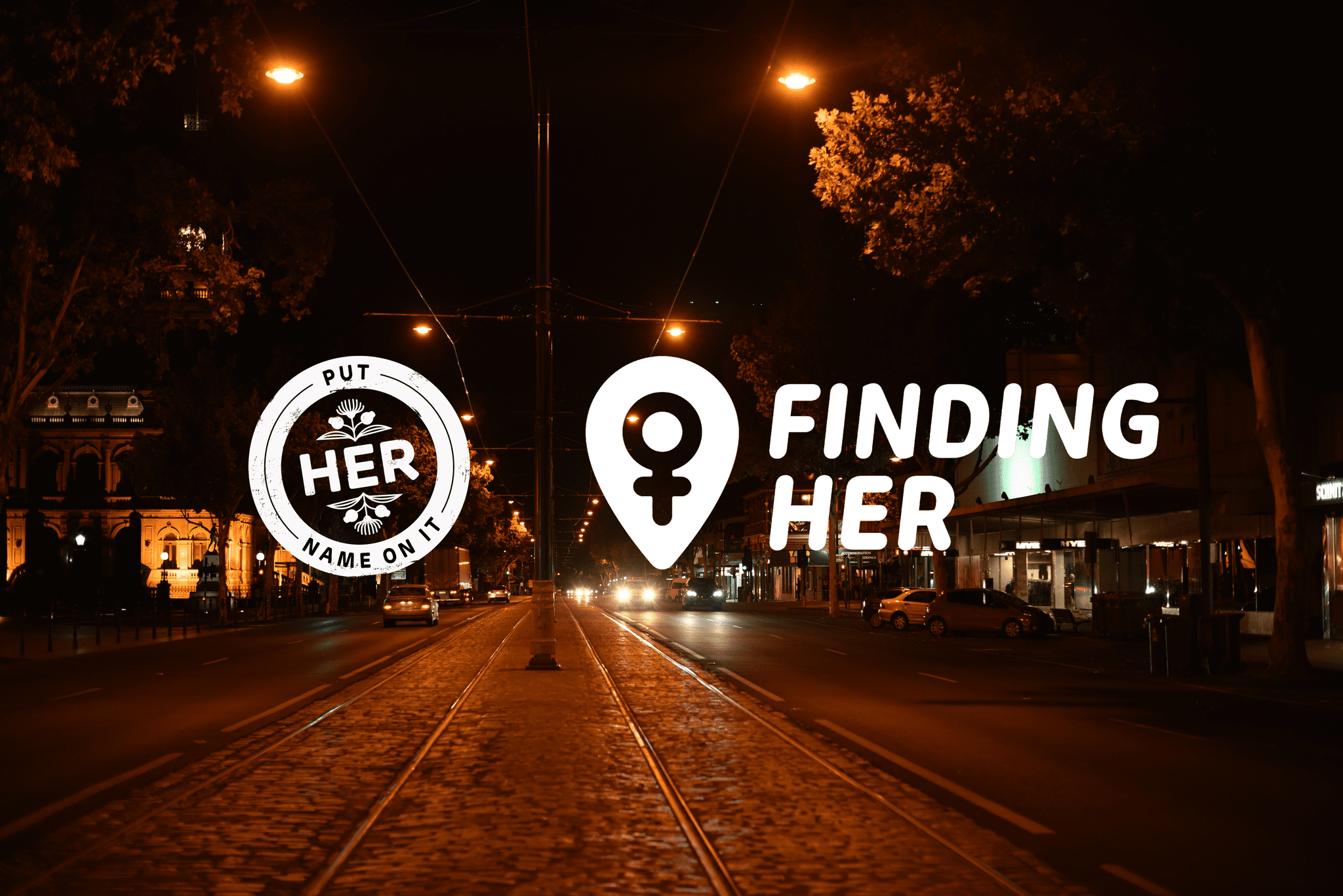
Women and gender diverse people have always made an impact on Victoria in business, arts, culture. Remembering the histories of those who were marginalised, and their contributions and commitments, is a way of helping shape the future.
For example, of Monument Australia’s 83 recorded commemorative monuments to Victorian people in the arts, only 20% are of women. For younger people, this picture sends the wrong message and we need this to change.
Finding Her, is a regional tourism and history project dedicated to making the stories, lives and achievements of women and gender diverse people visible in public space. We’re mapping over 100 women and gender diverse people who have shaped Victoria and linking the places and monuments that they’re connected to with videos, stories and photographs of their lives via QR codes on every site. We invite the public to visit these locations, connect with local history, and remember that women and gender-diverse people have always helped shape our world.
In the main street of Trentham, you’ll find a memorial clock with the dedication ‘Erected by a Grateful Public’ for Dr Gweneth Wisewould, an unconventional and beloved surgeon who worked in Trentham from 1930 to 1980. Wisewould was a defiant gender non-conforming doctor who wore men’s clothing, rarely billed for her services, rode a motorcycle and lived with her lifelong friend and companion Ella Bell. She was marginalised by the medical establishment in Melbourne who did not approve of her lifestyle or associates and was forced to resign from Queen Victoria Hospital. But her legacy did not end there.
Gweneth moved to Trentham with Ella and was beloved by her community who presented her with a silver brooch of gratitude for 25 years of dedicated service. In 1968, Gweneth donated $20,000 to the University of Melbourne to establish the Truganini Scholarship for Aboriginal students – a program that continues to this day.
In the Finding Her Map we commemorate the tenacity of Aboriginal women who preserved and shared their knowledge and traditions even in the face of oppressive colonial violence. One woman who exemplified this was the Kurnai woman known by white settlers as Kitty of Cunningham (also known as Youwali, Kitty Perry, Kitty Johnson). Kitty was a matriarch of the Brabuwoolong and Tatungoloong clans of the Kurnai of Gippsland. Born in 1830’s at Lakes Entrance, Kitty survived the Gippsland Frontier Massacres, lived through the Aboriginal mission station era and had first-hand experience of some of the most repressive and inhumane practices that targeted Aboriginal people.
Despite being forcibly removed from her Country, Kitty remembered and shared an enormous repository of Kurnai customs and traditions. A natural storyteller and teacher, Kitty passed on vital knowledge of how the sea and land movement changed the landscape of Lake Eyre and Lakes Entrance to create new sea and water entrances. She taught others about bush food, traditional medicines and tribal customs and passed on her basket and net making skills to other Aboriginal women. These same basket weaving skills are still used today.
Kitty’s longevity and willingness to share her knowledge and skills has provided the ongoing link and critical foundation on which generations of displaced Kurnai people have relied on to establish their links to Country and preserve their understanding of traditional ways. A survivor, Kitty’s commitment to remembering and teaching is a testament to the resistance and strength of Aboriginal people and reminds us tangibly that Victoria always was, and always will be, Aboriginal land.
Many Victorians will remember disability activist and comedian Stella Young, whose wit, intelligence and activism touched many and literally changed the way public places are built. At just age 14, Young conducted an accessibility audit of the shops on her local main street in Stawell, Western Victoria. Having been born with osteogenesis imperfecta, a genetic disorder that caused her bones to break easily, Stella used a wheelchair for much of her life and understood how constraining physically inaccessible buildings could be.
Stella worked to rectify and challenge the physical barriers and social stigma that limited disabled people. She served as editor of ABC’s Ramp Up Website and worked with the Youth Disability Advocacy Service to establish the LiveAccess project, where she advocated for better access to live music venues. Stella fought for disability to be considered in all forms of design, to make for a less limited life for all. She used humour and wit to make the case for a world where “disability is not the exception, but the norm.”.
Stella died in 2014, but is remembered by many in Victoria for her talent, activism and major contributions to accessibility in the state. In years to come, we want her story to be preserved and shared. Finding Her is our way of inviting people far and wide to remember and reflect on these local stories and the ways women have changed our world.
Through the process of remembering and recognising, we shape the future. We send the message that the stories and achievements of women and gender diverse people are important, hold power and deserve to be shared in public places.
Family consent has been sought to publish this information. Where there are no living members of family every effort has been made to seek consent from relevant members of the community.
The Finding Her project will be formally launched on March 28. We hope that you will share, visit and remember the monuments and stories of these women and gender-diverse people who have shaped our world. Finding Her is constantly expanding and we encourage local communities to consider whether there is someone in their community they would like to commemorate.
